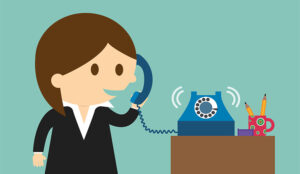It can be unnerving to answer the phone to a recorded message. But automated outbound voice calls can save money for call centres and have some interesting uses.
Matthew Brown looks at the good, the bad and the ugly of automated outbound voice calls.
The Good – NHS appointment reminders
Automated outbound calls are limited in the level of interactivity they can achieve. For delivering short, simple messages with little need for the person on the receiving end to respond, they can be very useful. An example of this is provided by Portsmouth Hospitals NHS Trust, which uses voice messaging to remind patients of upcoming appointments.
Before this technology was used, the Trust was experiencing an average of 3,300 missed outpatient appointments each month, out of approximately 43,000 outpatient appointments.
Maximising appointment slots
The Trust set a goal to cut down the number of missed appointments. One of the measures taken to achieve this goal was to introduce a way to remind patients of an upcoming appointment. The Trust invested in a messaging solution from Voicesage, which enables voice and text messages to be sent to patients’ mobile and landline phones, reminding them of an upcoming appointment. Because the messages are interactive, patients can respond and reschedule appointments easily.
The new system has cut missed appointments considerably. In July 2010, for example, the rate at which patients missed appointments fell by 38%.
A simple reminder of an upcoming appointment seems to be an ideal situation for automated messages to deal with. Using both text and voice messages negates the problem of a purely SMS-message-based service, as people who don’t own a mobile are likely to have a landline at least.
Flood warnings
Similar automated messaging systems are used by local councils in the UK to warm residents about possible floods. In Scotland, Moray Council offers a voice and text message service that warns people living in the River Lossie corridor when a flood may be on the way. Residents currently have to sign up for the system via the council’s website.
The Bad – politics
The use of automated outbound calls can be against the law. Under the Privacy and Electronic Communications Regulations 2003, automated marketing calls can only be made to people who have given permission for the organisation making the call to contact them in that way.
The Information Commissioner’s Office (ICO) advises people who receive such calls against their wishes to write to the organisation concerned. If the calls persist, the ICO is responsible for dealing with complaints about marketing calls and may be able to help.
Liberal Democrats caught out
Ironically one of the highest-profile organisations to be warned for using automated voice calls in recent years is the Liberal Democrats.
In September 2008 the Liberal Democrats made automated outbound calls to 250,000 members of the public following leader Nick Clegg’s speech to the party conference. Callers answered the phone to hear a recording of Clegg telling them about key Lib Dem policies, before being asked to use their phone’s keypad to respond to questions.
Political rivals complained about the calls on the grounds that political parties – like businesses, and any other organisation – aren’t allowed to make unsolicited automatic marketing calls. The Lib Dems defended themselves by claiming that the calls were for market-research purposes and couldn’t be classified as direct marketing.
But an investigation by the ICO ruled otherwise, and the Lib Dems were issued with an enforcement notice to stop the use of these calls.
A message from Sean Connery
The Liberal Democrats weren’t the first party warned for using voice messages. In 2005, the Scottish National Party (SNP) used a message featuring a recording of actor Sean Connery, a prominent supporter, to contact 250,000 people. They too received a warning from the ICO. The SNP case illustrates the importance and difficulty of the requirement to obtain consent. Although the Information Commissioner made clear he had no reason to believe the SNP didn’t have consent of those who were called, political rivals expressed doubt over the legality of the messaging tactic.
The Ugly – direct marketing
A lot of companies still use unsolicited automated outbound marketing calls, despite the regulations. From 1 April 2009 to 31 December 2010, the ICO received 2,586 complaints about automated calls. According to telecoms campaigner David Hickson, such automated messages are now believed to be a bigger problem than silent calls.
“I personally get about 2-3 of this type of call each week,” said Hickson. “Often they are things like debt advice, or advice on making a will, or offering help with your computer.”
For recorded message calls to be legal, the receiving party must have given explicit consent to allow the company to contact them in such a way.
Such calls are often considered a nuisance by the public. Quite apart from alienating potential customers, they may also be in breach of the current regulations.
Hickson believes the solution is to do one of two things.
Change the regulations
Firstly, the government could change the regulations, which have scope to be relaxed. This could allow organisations to make automated outbound message calls provided the opportunity to speak to an agent was offered. Obviously, a condition of this would be that agents need to be on hand to take any calls that were put through in this way.
Take action
The other option is for the Information Commissioner’s Office to take action. But this could be difficult.
“I have had chats with the people at the ICO, and they’ve said it’s very difficult because of the sort of evidence they have to obtain,” said Hickson.
“They could find out who’s doing it, and let them know that this is not on. I can’t see – from a call centre point of view – that this is a legitimate marketing technique.”

Matthew Brown
Part of the problem, in Hickson’s view, is that companies using such messages believe they are allowed to do so provided they simply exclude phone numbers of people who have listed with the Telephone Preference Service. In essence, they are assuming consent when they need explicit consent.
Perhaps stronger regulation would deter companies from making unsolicited message calls. Automated outbound voice calls have clear potential for broadcast-type communication in the future, especially in the public sector. In the private sector, nuisance marketing calls persist, and in some cases, it isn’t entirely clear what should be done about them.
How to complain about unsolicited automated calls
The ICO runs a helpline (0303 123 1113) providing advice on how to deal with unsolicited calls.
Alternatively, complaints can be made by filling out a Privacy and Electronic Communications complaint form, available from the ICO website.
What has been your experience of automated calls? Please share your thoughts
Author: Jo Robinson
Published On: 2nd Mar 2011 - Last modified: 30th Jun 2017
Read more about - Technology, Outbound dialling
















I’m glad to see some organisations (such as the NHS) using this technology responsibly and for a legitimate reason. My only concern is that if more organisations start to use this technology to sell products (or services) then consumers will start hanging up as soon as they realise it is an automated message. Perhaps the use of automated messages should be reserved informing the public of key information (such as floods and appointments etc).
Un-solicited marketing is not good by any means, but automated messages to existing customers does prove very successful. A simple way to tell customers of special discounts available. I have many examples were automated messaging increases on-line sales and never receives complaints as it directly benefits the customer
Our post-engineer/home visit/delivery automated outbound surveys are very well received, achieving a high level of acceptance and survey completion. The key elements are to make the survey quick, offer an Opt-in to take part and conduct the survey minutes after the on-site vist has finished.
I am irritated over the NHS using automated reminders and particularly for their automated surveys.
It is difficult to stop the NHS using the number once the NHS has it as the information is passed between services, removing it from one provider e.g. GP, I find the information has cropped up somewhere else and possibly redistributed to the GP.
Often, there are several people using a landline who have given their telephone number to a surgery or hospital without explicitly agreeing to either reminder or automated surveys because the surgery has insisted the patient cannot be registered unless they provide a number! The patients privacy is breached each time an automated survey is done, as it gives the patients name when the phone is picked up, AND (as in the case of having several people at the same address with the same name), receptionists regularly give patient information while reminding patients of appointments (even when the patient hasn’t given permission to be contacted for appointment information) – receptionists lie and do not own up to this when brought to task.
So, automated calls, appointment reminders, automated surveys etc. breach patient confidentiality.